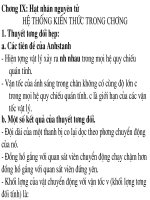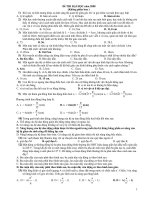On thi dai hoc 3 2008 co dap an
Bạn đang xem bản rút gọn của tài liệu. Xem và tải ngay bản đầy đủ của tài liệu tại đây (50.67 KB, 4 trang )
English Practice
I. Phonetics
1.
a. columns
b. grades
c. parents
d. volunteers
2.
a. garage
b. gesture
c. guest
d. guarantee
3.
a. bath
b. bathing
c. breath
d. healthy
4.
a. boasted
b. concluded
c. perceived
d. repeated
5.
a. dolls
b. chairs
c. countries
d. plates
II. Stress
6.
a. hockey
b. involve
c. revise
d. select
7.
a. defensive
b. spectator
c. technical
d. wonderful
8.
a. eleven
b. example
c. origin
d. synthetic
9.
a. authority
b. disadvantage c. photographer d. relationship
10.
a. combination
b. satisfaction
c. transportation d. necessary
III. Vocabulary and Structures
11. Take this road and you will …………at the hotel in 5 minutes
a. find
b. come
c. arrive
d. reach
12. The shops are always …………of people at Christmas time.
a. full
b. stuffed
c. busy
d. crowded
13. My little brother said that the mirror was …………broken.
a. accident
b. accidental
c. accidentally
d. by accident
14. The headmaster …………several announcements
a. did
b. said
c. spoke
d. made
15. I know for…………that he was away from home last night.
a. fact
b. correct
c. certain
d. true
16. The council decided to …………the road to improve the traffic.
a. lengthen
b. enlarge
c. increase
d. widen
17. I can’t start eating because the food is too…………
a. hot
b. cold
c. dirty
d. expensive
18. When my father applied for his passport to be renewed, he had to send two …………
photographs
a. fresh
b. late
c. recent
d. modern
19. A person who speaks on the radio is a …………
a. radiator
b. loudspeaker
c. newsman
d. broadcaster
20. Thank you for …………me about the meeting tomorrow.
a. remind
b. reminding
c. remember
d. remembering
21.Did you enjoy the show last night? –Yes, but I wish …………a cold.
a. hadn’t
b. didn’t have
c. hadn’t had
d. wouldn’t have
22. …………beautiful dress you have on!
a. what
b. How
c. What a
d. How a
23. Do I have to take that French course?- No, you …………
a. needn’t
b. mustn’t
c. haven’t
d. don’t have
24. This is the first time I …………the experiment on plant breeding.
a. do
b. would do
c. did
d. have done
25. They worked hard …………they might be well prepared for the exam.
a. then
b. since
c. because
d. so that
26. …………students study hard before an exam.
a. most of
b. most the
c. most of the
d. almost the
27.It was in the house …………
a. where I was born
b. I was born in c. that I was born
d. in
which I was born
28. Let’s go for a walk after dinner, …………?
a. do we
b. do you
c. don’t we
d. shall we
29. It’s …………nice a day ………… we should do something.
a. either/or
b. neither/nor
c. so/that
d. such /that
30. Not everyone …………gold. In fact, most people’s dreams of quick riches never came …………
a. saw/real
b. found/ true
c. saw/true
d. found/real
Edited by Ly Viet Dung
2008
3-
Read the passage and choose the best words:
There are a lot of ……1…… in the world of language teaching today when the ……2…… of
Education explained his plans for schools over the ……3…… five years. One of the plans is that
……4……children will start learning two foreign languages ……5…… the age of six. When they
enter high school, there is the …6……… of adding one more language.” The government plans
are a real ……7…… for celebration,” said Mary Spencer, a French ……8…… at City High school”
these new plan for language teaching show that the Secretary has ……9…… the old problems
with intelligence and imagination. These plans are certainly a great ……10…….
31.
a. amusement
b. excitement
c. enjoyment
d. disappointment
32.
a. Head
b. Leader
c. Director
d. Secretary
33.
a. Next
b. future
c. coming
d. following
34.
a. the
b. all
c. these
d. those
35.
a. in
b. all
c. from
d. until
36.
a. likelihood
b. opportunity
c. possibility
d. probability
37.
a. cause
b. reason
c. result
d. effect
38.
a. engineer
b. teacher
c. electrician
d. architect
39.
a. reached
b. revealed
c. discussed
d. solved
40.
a. attainment
b. agreement
c. achievement d. movement
Find the mistakes
41. (A)As a stranger at the party, I stood (B)alone for some time, then walked over to (C)an
interesting-looking person and (D)introduce myself.
42. I (A)had to drive to the factory (B)to pick up my brother, (C)who’s car wouldn’t (D)start.
43. (A)My grandfather , (B)who is a wise man, (C)has greatly influenced (D)on my life.
44. It(A) is hoping that all present day (B)communicable diseases (C)will be conquered (D)some
day.
45. (A)What we know about certain diseases (B)are still not sufficient to prevent them (C)from
spreading easily (D)among the population.
Sentence transformation
46. We lost our way because the signpost were confusing.
a. The signposts were confusing which made us lose our way.
b. we lost our way because the signposts were confused.
c. we lost our signposts because they were confusing.
d. Because the signposts were lost, we were confused.
47. I went to sleep immediately when the train lest the station.
a. I went to sleep right before the train left the station.
b. I fell asleep as the train left the station.
c. I went to sleep immediately if the train left the station
d. I slept immediately after the train reached the station.
48. We took a train to Liverpool last Saturday
a. We went to train as a Liverpool player last Saturday
b. We went to Liverpool to train for a match last Saturday
c. Liverpool was the city we could go by train last Saturday.
d. We went to Liverpool by train last Saturday.
49. Who has to lock the doors when the office closes?
a. Who has locked the doors when the office closes?
b. Who should lock the doors when the office closes?
c. Who is responsible for locking the door when the office closes?
d. Who unlocks the doors when the office closes?
50. It appears that we have no coffee left.
a. we seem to run out of coffee.
b. we appear to have left our coffee
c. No coffee seems to be found
d. The coffee seems to disappear.
Edited by Ly Viet Dung
2008
3-
III. Reading:
The influenza virus is a single molecule composed of millions of individual atoms. Although bacteria
can be considered a type of plant, secreting poisonous substances into the body of the organism
they attack, viruses, like the influenza virus, are living organism themselves. We may consider them
regular chemical molecules since they have strictly defined atomic structure; but on the other hand,
we must also consider them as being alive since they are able to multiply in unlimited quantities.
An attack brought on by the presence of the influenza virus in the body produces a temporary
immunity, but, unfortunately, the protection is against only the type of virus that caused the
influenza. Because the disease can be produced by any one of the three types, referred to A, b, or C
and many strains within each type, immunity to one virus will not prevent infection by another type
or strain.
Approximately every ten years, worldwide epidemics of influenza called pandemics occur. Though to
be caused by new strains of type A virus, these pandemic viruses have spread rapidly, infecting
millions of people. Epidemics or regional outbreaks have appeared on the average every two or three
years for type A virus, and every four or five years for type B virus.
51/ According to the passage, bacteria are ….
a. poisons
b. very small c. larger than viruses
d. plants
52/ Why does the writer say that viruses are alive?
a. they have a complex atomic structure
b. they move
c. they multiply
d. they need warmth and light
53/ The word “ strains” is closest in meaning to …
a. theories
b. injuries
c. varieties
d. weaknesses
54/ How does the body react to the influenza virus?
a. it prevents further infection to other types and strain of the virus.
b. it produces immunity to the type and strain of virus that invaded it.
c. it becomes immune to types A, B and C viruses but not to various strains within the types
d. after a temperature immunity, it becomes even more susceptible to the type and strain that
caused the influenza.
55/ The author names all of the following as characteristics of pandemics except
a. they spread very quickly
b. they are caused by type A virus
c. they are regional outbreaks.
d. they occur once every ten years.
Throughout history, the search for salt has played an important role in society. Where there was no
salt near, it brought from great distances. Thus, salt became one of the most important articles of
early trade. Records show that in area of scarcity, salt was traded ounce for ounce for gold. Rome’s
major highway was called the Via Solaria, that is , The salt Road. Along that road, Roman soldiers
transported salt crystal from the salt flats at Ostia up the Tiber River. In return, they received a
solarium or salary, which was literally money paid to soldiers to but salt. The word ‘ world their
salt,” which means to be valuable, derives the custom of payment during the empire. The caravan
trade of the Sahara was also primarily an exchange of goods for salt. Among ancient peoples there,
to eat salt with another person was an act of friendship. Slaves were often purchased with salt. Salt
was so important in the Middle Ages that governments retained salt trade as a monopoly, or levied
taxes on its purchase. By then, people’s social rank was demonstrated by where they sat at the table
above or below the salt.
Even today, in some remote regions of the world, salt is a luxury item. In fact, in a few isolated areas
of Southeast Asia and Africa, cakes made of salt are still used for money
56/ What was the rate of exchange for salt and gold in areas where salt was a scarce commodity?
a. one to one
b. one to two c. one to ten
d. one to sixteen
57/ If a man is “ world his salt”, he is ….
a. a soldier
b. a thirsty person
c. a valuable employee d. a highly paid worker
58. What does the Latin word solarium mean?
a. salt
b. salary
c. soldier
d. the salt road
59/ Who enjoyed a monopoly on the sale of salt?
a. soldier of the Roman Empire
b. Traders in the Sahara
c. governments in the Middle Ages
d. People of high social rank
Edited by Ly Viet Dung
2008
3-
60/ The word” retained” could best be replaced by…
a. reserved
b. transferred c. denied
The end
Edited by Ly Viet Dung
2008
d. designated
3-









